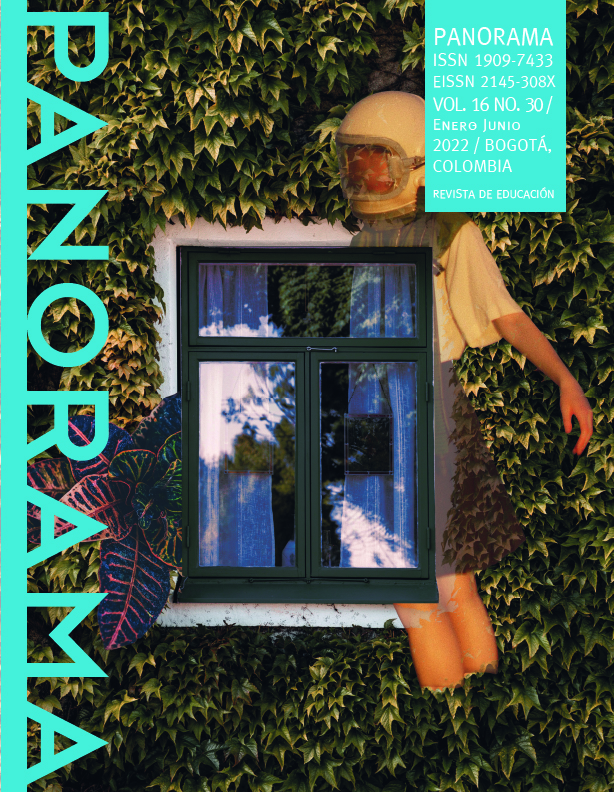Abstract
The present text makes you a reflective description about the strategies implemented by the teachers of Gabriela Mistral both gender Urban School, of the municipality San Sebastián de Buenavista, department of Magdalena, during the development of the methodology “Academic Work at Home” due to the suspension of academic activities in on - site by students and teachers by the risk of infection of COVID-19. This reflection pretends to explain the way it was possible to continue the teaching process in emerging educational in spaces and the importance of factors such as collaborative work, the rethinking of classroom practices, the implementation of TIC and self-learning, to construct a new paradigm of the concept of teaching in a new reality educational and in a context of crisis.
References
Adell, J. y Castañeda, L. (2012).Tecnologías emergentes, ¿pedagogías emergentes? En J. Hernández, M. Pennesi, D. Sobrino y A. Vázquez (coord.). Tendencias emergentes en educación con TIC. Barcelona: Asociación Espiral, Educación y Tecnología. págs. 13-32. ISBN: 978-84-616-0448-7. https://digitum.um.es/digitum/handle/10201/29916 .
Garibay, B. Y Vázquez, R. (2002). Educación centrada en experiencias de aprendizaje. Un enfoque empírico en ingeniería electrónica. De la praxis a la teoría. http://quadernsdigitals.net/datos_web/articles/educar/numero12/educacion.htm
Gimeno, J. (1992). Teoría de la Enseñanza y Desarrollo del Curriculum. ISBN 84-207-2016-X
Gómez Parra, S. (2010). Situaciones de aprendizaje y evaluación. Padres Y Maestros / Journal of Parents and Teachers, (329), 5-9.
Hernández Sampieri, R., Fernández Collado, C., & Baptista Lucio, P. (2014). Metodología de la investigación: Roberto Hernández Sampieri, Carlos Fernández Collado y Pilar Baptista Lucio (6a. ed. --.). México D.F.: McGraw-Hill.
Jaimes, G. y Callejas, M. (2009). La autonomía, los procesos de pensamiento y las TIC: competencias del siglo XXI. Temática contemporánea de aplicación en escuelas, colegios y universidades. https://www.worldcat.org/title/autonomia-los-procesosdel-pensamiento-y-las-tic-competencias-del-siglo-xxi-tematica-contemporanea-de-aplicacion-en-escuelas-colegios-y-universidades/oclc/981409832
Londoño, C., Rave, J., Cárdenas, N., Martínez, J. y Ángel, V. (2016). Evaluación o calificación en humanidades. Seis experiencias en contexto universitario. http://repositorio.utp.edu.co/dspace/handle/11059/6435 .
Lugo, M. y Kelly, V. (2010). Tecnología en educación: ¿políticas para la innovación? Buenos Aires: Instituto Internacional de Planeamiento
de la Educación IIPE-Unesco, 2010. 13 p.; 28x21 cm. ISBN 978-987-1439-77-5 1. Políticas Educativas. 2. Tecnología en Educación.
Ministerio de Educación Nacional (2020) Directiva 05: Orientaciones para la implementación de estrategias pedagógicas de trabajo académico en casa y la implementación de una modalidad de complementario para consumo en casa. https://www.mineducacion.gov.co/1759/w3-article-394577.html?_noredirect=1
Rosales, M. (2014). Proceso evaluativo: evaluación sumativa, evaluación formativa y Assesment su impacto en la educación actual. En: Congreso Iberoamericano de Ciencia, Tecnología, Innovación y Educación. https://docplayer.es/6222841-Proceso-evaluativo-evaluacion-sumativa-evaluacion-formativa-y-assesment-su-impacto-en-la-educacion-actual.html
Sarramona López, J. (1999). La Autoformación en una Sociedad Cognitiva. RIED: revista iberoamericana de educación a distancia, ISSN 1138-2783, Vol. 2, Nº 1, 1999.
Severin, E. (2017). Un nuevo paradigma educativo. Revista Educación Y Ciudad, (32), 75-82. https://doi.org/10.36737/01230425.v0.n32.2017. 1629
Sevilla Martín, V. (2014). Resiliencia: revisión bibliográfica. Universidad de Jaén, España. http://tauja.ujaen.es/bitstream/10953.1/956/1/TFG_SevillaMartin,Vanesa.pdf
Solórzano Robledo, R. (2016). La Escuela como institución generadora de experiencias de aprendizaje. https://www.educacionfutura.org/la-escuelacomo-institucion-generadora-de-experiencias-de-aprendizaje/

This work is licensed under a Creative Commons Attribution-NonCommercial-NoDerivatives 4.0 International License.
Copyright (c) 2021 Institución Universitaria Politécnico Grancolombiano





